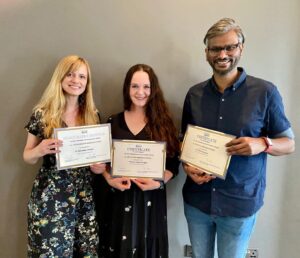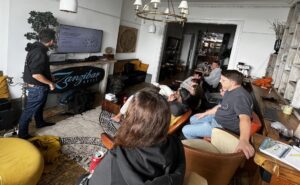
It has been a busy first year for the CONSPIRACY_FX project and the team. This is just a snippet of what we have been up to!
The project started in January. We welcomed Post-Doctoral Research Associates Ricky Green and Daniel Toribio-Florez, and Project Officer Cassidy Rowden to their new roles. We launched our project website and sent our first tweet. And the research was underway! In our first experiments, we examined the consequences of conspiracy theories for the people who share them, focusing on the impressions people (e.g., politicians) make on others when they share conspiracy theories.
In February, Karen spoke to Jeremy Vine on BBC Radio 2 about COVID-19 conspiracy theories. She also presented at two pre-conferences at the Society for Personality and Social Psychology conference.
In March, Ricky successfully defended his PhD dissertation and Daniel delivered his introductory talk to the Political Psychology lab group, introducing some new research ideas about how exposure to conspiracy theories may influence political attitudes.
April was a busy month for the team. We held our first event, welcoming Dr Daniel Jolley from the University of Nottingham to give a talk on intergroup conspiracy theories. In our research, we started examining the effects of sharing conspiracy theories on people’s relationship prospects. Ricky visited the Universite libre de Bruxelles to present some of this new work. We also received our CONSPIRACY_FX hoodies!

In May, we continued our research by examining how people’s satisfaction in their current relationships with others is shaped by conspiracy beliefs. We also had a bit of fun by introducing the world to our ‘Conspiracy Generator’, designed to help explain what makes a good conspiracy theory and to demonstrate just how easy it is to come up with a plausible conspiracy theory. Daniel also successfully defended his PhD.
June was a busy and successful month for Karen. She attended the British Academy Summer Showcase in which she helped visitors explore the key elements of conspiracy theories and how to spot them. She also delivered a keynote speech at the Association of Social Psychology Researchers in The Netherlands, and was awarded the Advanced Researcher Prize at the University of Kent!

In July, Ricky attended the International Society of Political Psychology Conference in Athens, and he gave a talk on his PhD research and new research from the project. Unfortunately, Karen was unable to attend the conference in person due to COVID-19, but she was able to deliver her talk remotely and bounced back to contribute to a panel discussion about conspiracy thinking to the Standon Calling music festival later in the month. In this month, Daniel and Karen joined the Trust in Science and Science-Related Populism (TISP) Many Labs study, which seeks to analyse the factors that affect trust in science, and the factors that predict science-related populist attitudes across countries. Daniel and Karen will work with some of the collaborators to further examine how these variables are associated with people’s belief in climate change and vaccine-related conspiracy theories.
By August, the whole team needed a well-earned holiday! But we still found time to start the search for our Post-Doctoral Research Associate in Computing, and we are delighted to announce that Imane Khaouja was successful and will be joining us in February 2023.
September saw the publication of our first research paper ‘Making an impression: The effects of sharing conspiracy theories’, highlighting how people’s and politicians’ interpersonal impressions can be influenced by sharing conspiracy theories. Also in September, Karen delivered a keynote speech at the Italian Association of Psychology conference and delivered a presentation at the Symposium on Social Psychology in Madrid, Spain. Within the framework of this symposium, the group prepared a theoretical article about the implications of conspiracy theories for people’s interpersonal relationships (more information about this in 2023).
In October, the CONSPIRACY_FX project hosted a writing retreat for members of the University of Kent Political Psychology lab group. This was an opportunity to share and receive feedback on our research to date, as well as hear about the other research happening within the group. Karen also delivered the Bernoulli Lecture in Basel, Switzerland.

In November, it was time to celebrate as Ricky attended his PhD graduation ceremony. Karen gave a keynote speech at the Society of Australasian Social Psychologists conference.
In December, Karen published a CONSPIRACY_FX paper with Robbie Sutton entitled ‘Rabbit Hole Syndrome: Inadvertent, accelerating, and entrenched commitment to conspiracy beliefs’. In this paper, Robbie and Karen discussed how conspiracy theories can lead people down “rabbit holes” that are difficult to escape. We drew our first conclusions about how conspiracy theories affect interpersonal relationships, and we also began to examine potential reputational consequences for professionals who share conspiracy theories. Additionally, we began to examine how people think a politician might share conspiracy theories in order to influence different audiences. Karen appeared on the Infinite Monkey Cage show on BBC Radio 4 to discuss why conspiracy theories seem to have exploded over the last few years. Finally, the year went out with a bang at the CONSPIRACY_FX Christmas get together, where we joined fellow political psychologists for an 80s party in Margate!

Cheers from the CONSPIRACY_FX team, as we look forward to an exciting 2023 ahead!